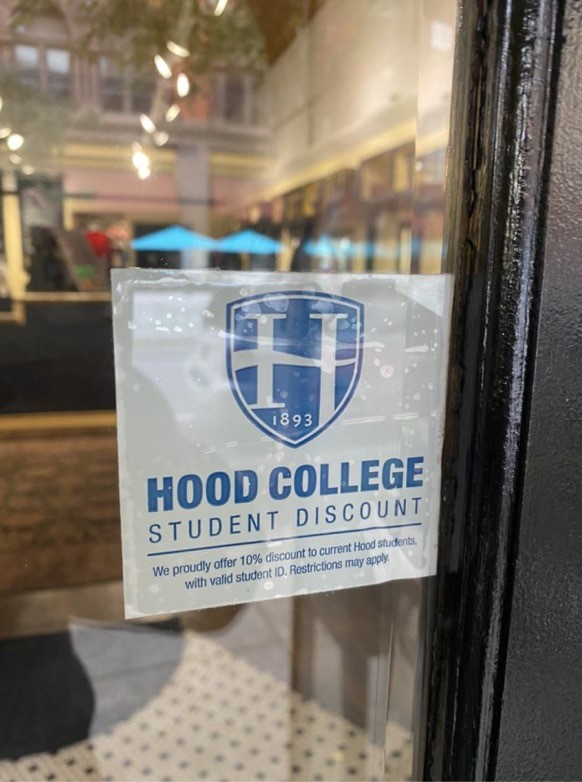
By Sofia Montoya-Deck
As the topic of Diversity, Equity and Inclusion (DEI) has become increasingly important on college campuses, Hood College officials are ensuring the prioritization of these initiatives through the establishment of a new administrative position, strategic planning goals and updated curricula.
In January 2024, Hood hired Akeem Todman to fill the college’s inaugural role of director of Inclusive Excellence.
Before coming to Hood, Todman served as the director of Diversity and Inclusion at Stetson University in DeLand, Florida, where he acted as a senior administrator of the Cross-Cultural Center, chair of the Bias Education and Support Team and adviser for the Multicultural Student Council.
According to Todman, diversity, equity and inclusion are more than just buzzwords and talking points. “The application of DEI, as a framework, is used to enrich learning experiences, promote equity and prepare students for success in a globalized world,” he said. “The concept of DEI should [be seen] as integral to our lives as it provides us with a lens for which we should analyze and make meaning of the world we inherited.”
The position of director of Inclusive Excellence was created within the Division of Community and Inclusivity to further Hood’s values as they relate to DEI. In this position, Todman assists the vice president for Community and Inclusivity, Tammi Simpson, with the implementation and assessment of DEI on Hood’s campus. This includes developing events and programs that educate and engage the Hood community in its promotion of DEI and a sense of belonging.
Todman also provides education to students, staff and faculty regarding the prevention of and response to sex- and gender-based violence. Working collaboratively with other departments, this is meant to promote the development of a healthy campus culture.
According to the Hood website, the college’s long-standing dedication to diversity goes back to its founding as a women’s college at a time when women were significantly marginalized, especially in regard to educational opportunities. “In the 1970s, the college became co-educational to welcome more diversity of thought and opportunity for our students,” the website states.
“The main thing people should know about [DEI] at Hood College, is that we are committed to ongoing education and growth as it relates to our community,” Simpson said. “We are very diverse, and we are committed to being the best versions of ourselves in a holistic way.”
Hood’s 2022-2026 strategic plan, “For a Greater Hood,” contains six key goals, the second of which is “Diversity, Equity & Inclusivity Initiatives.” The first step of this goal consists of developing DEI initiatives with the purpose of promoting an inclusive community at Hood.
The plan additionally encourages examining and improving structural policies and practices that impact diverse members of the Hood community.
Through this strategic plan, as well as other initiatives, Hood aims to promote diversity and belonging on the campus. “It is something that we value first and foremost,” Simpson said. “It’s in the fabric of our DNA at Hood College.”
Hood has a diverse student population with 41% of students coming from underrepresented racial or ethnic populations as well as students from foreign countries.
“Hood College has always valued diversity, whether it be diversity in terms of people or diversity in terms of thought,” Simpson said. “We value the importance of diversity and are committed to making sure that our community is welcoming to all.”
In consultation with Paige Eager, Hood’s dean of the faculty, Simpson explained that the college’s DEI efforts additionally include incorporating diversity in an updated core curriculum. The current core curriculum addresses diversity through the global perspective’s requirement.
“In the new Heart, Mind & Hands core curriculum—which will launch in fall 2025—diversity, equity and inclusivity will be incorporated through required service learning for all first-year students,” Simpson said. “Also, there are two ‘mind’ categories—ethics and diversity—which will explicitly require all to take at least one course in those two categories.”
According to Todman: “In a relationship-rich environment like Hood College, where we have an intimate community setting and emphasis on holistic education, the concept and application of DEI cultivates empathy, critical thinking and civic engagement, which aligns with the college’s core values of Hope, Opportunity, Obligation and Democracy.”
“It’s really something that is both ongoing and aspirational in terms of our endeavors,” Simpson said of the school’s DEI initiatives. “Our hope is that we increase engagement and participation as it relates to DEI so that we have 100% participation in these important areas.”
Todman further encourages members of the Hood community to challenge their own relationship with DEI in an attempt to better themselves and Hood as a whole. “For those who may feel like there is no on-ramp into the conversation about DEI, I challenge you to interrogate your beliefs and the ways in which your social identities … have informed these beliefs,” he said. “Once you’ve grappled with these constructs, I then challenge you to get proximate – read a book, listen to varying perspectives from peers, professors or trusted sources. Once you’ve done these things, I challenge you to challenge those your most proximate to, to get proximate.”




Be the first to comment